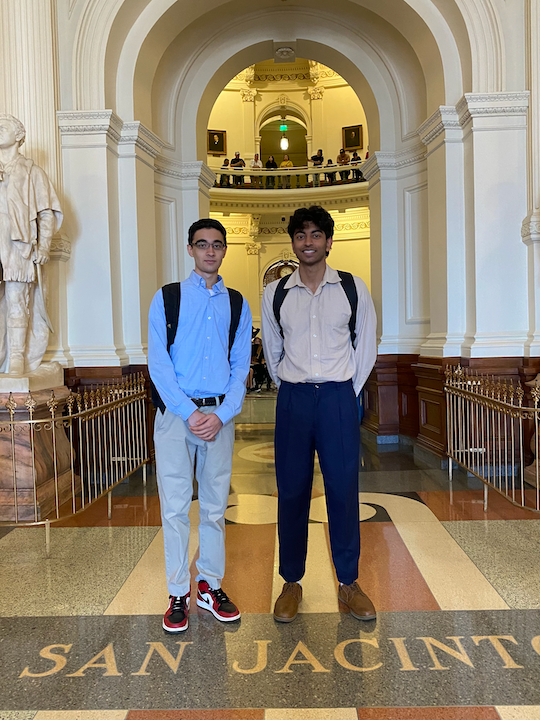
[ad_1]
As a sophomore, Shonik Ganjoo (Lovett ’24) reached out to the management at Doctors for Change, a nonprofit that helps equitable entry to well being care in Houston and Texas by means of analysis, training, collaboration and advocacy, about beginning a Rice chapter to offer undergraduates an opportunity to be concerned.
Since then, Ganjoo has spent his time as president of the chapter — in between the commitments that include being a biosciences main and an anthropology minor — researching and advocating for immigrant well being fairness. He and the chapter’s vice chairman, Ritesh Dontula (Sid Richardson ’23) have been creating alternatives for Rice college students to work together with Texas legislators on real-world points.

Last month, Ganjoo, Dontula and the Rice chapter traveled to Austin to satisfy with state Reps. Jon Rosenthal and Jared Patterson and spoke about their advocacy efforts, communicated the findings of their analysis and offered academic supplies. The chapter beforehand joined the Baker Institute for Public Policy’s Vaccines Cause Adults marketing campaign on the Texas Capitol to advertise vaccine fairness.
“Rep. Rosenthal was very receptive to the policy recommendations that we were providing, but he also gave us great advice to guide our advocacy efforts. For instance, he offered some insights into ways that we can approach our advocacy strategy and informed us about specific representatives that we might consider having conversations with,” Ganjoo stated.
“Through these conversations, we discovered that some of our policy recommendations garnered bilateral support,” stated Dontula, who’s majoring in biosciences and double minoring in enterprise and medical humanities. “For instance, our proposal to relax restrictions on international healthcare workers in exchange for their mandated service in rural Texas communities struck a chord with both parties. This experience taught me the value of taking incremental steps towards bridging the partisan divide in our state. As a child of immigrants, it was particularly rewarding to advocate for policies that would positively impact the lives of immigrant communities.”
Ganjoo defined that within the biosciences it’s not conventional to discover the well being coverage area, however by means of programs and scientific experiences as a pre-med scholar he is ready to immediately have interaction with the very inhabitants he and the Doctors for Change chapter needs to assist by means of laws.
“That has been really important for us, because ultimately the interpersonal or microscale interactions that we’ve had with immigrants in these health care settings is informing the way that we advocate for systemic changes through a policy-based approach,” he stated. “Scaling the micro-level to macro-level continuum of health will be crucial for guiding our approach to healthcare and ultimately serving as effective physicians in the future.”
Ganjoo and Dontula have been working intently with the college and employees at Doctors for Change, together with physicians and public well being specialists, on a coverage transient on immigrant well being care in Texas. They collected related analysis and particularly examined the difficulty from an financial standpoint.
The transient, which might be printed within the upcoming challenge of the Rice Journal of Public Policy, explains the obstacles to sufficient well being care immigrants in Texas have confronted regardless of making up greater than 20% of the state’s workforce and contributing virtually $8.7 billion in state and native taxes every year.
“We’ve focused, for example, on some of the general economic benefits that immigrants provide to the Texas economy; on top of that, we have examined the costs and exorbitant expenditures that hospital systems are unnecessarily incurring due to this lack of access for immigrants,” Ganjoo stated. “Through this economic lens, we’ve crafted an argument and developed robust policy proposals for better supporting immigrant health in Texas.”
“Ultimately, my hope is that our efforts will help create a healthcare system in Texas that is more equitable and just, regardless of immigration status,” Dontula stated.
[adinserter block=”4″]
[ad_2]
Source link